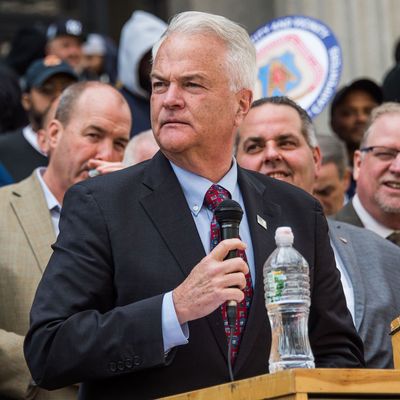
There are many jobs — most, in fact — where the inability to perform the basic duties required of said jobs is grounds for termination. Being a police officer in at least two New York City boroughs is apparently not one of those jobs. On Monday, Gothamist–WNYC reported that the Staten Island district attorney’s office is compiling a list of police officers whom its attorneys will not allow to testify in court. These officers will be barred because they lie too much, as alleged by federal and state judges and local prosecutors. The Brooklyn DA’s office keeps a similar list.
Prosecutors in all five boroughs track NYPD officers in secretive databases who they think are dishonest, but Staten Island and Brooklyn appear to be the only two that use their lists to bar them from testifying. As one might guess, the ability to testify credibly in court is important for a police officer. Criminal cases rely often on statements made by the officials who investigated or arrested the defendants involved. If an officer can’t do this, it hampers his or her ability to ensure that the people caught doing crimes get convicted of those crimes — which is how, I’d imagine, most officers want the cases they’re involved with to resolve. “Do not call” lists like those used in Staten Island and Brooklyn are more severe than those kept in Manhattan and elsewhere because they disallow testimony. Manhattan’s broader list is reportedly more of a guide to help prosecutors disclose dishonesty concerns to defense attorneys.
Questions abound as to how effectively these lists are actually being used, whose names are on them, how they got there in the first place, and whether officers can petition to get theirs removed. In Staten Island, there currently appears to be no mechanism for removal. The Brooklyn DA’s office in November publicized dozens of the names it has compiled, following a FOIL appeal submitted on Gothamist–WNYC’s behalf. Staten Island has refused to release it list, telling reporters that it “remains under construction.” Spokespersons also clarified that the Staten Island DA’s office doesn’t necessarily consider every finding on its list to be accurate. But as these and other questions await clarification, a damning reality persists: There’s still an untold number of NYPD officers working today who are such huge liars that their legal testimony is no longer considered worth the risk.
This raises questions about why officers whom even prosecutors — their closest natural allies in the criminal-legal system — fear might torpedo their cases because of their dishonesty are still being entrusted with public safety. One possible answer is that it’s really hard to fire police. There’s scant political will, let alone motivation within America’s notoriously clannish police departments, for ensuring officers can’t kill whomever they want with impunity, to say nothing of punishing them for lying. And whatever will might exist is reliably quashed by police unions. In Philadelphia, where reform-minded prosecutor Larry Krasner runs the DA’s office, the Fraternal Order of Police sued Krasner over his maintenance of a similar list. (Its efforts have thus far been unsuccessful.) In the course of shielding their members from accountability and cowing elected officials to do their bidding, police unions have also been among the most vocal critics of New York’s “do not call” lists. “The Brooklyn DA has a long history of bad prosecutions,” Sergeants Benevolent Association president Ed Mullins told Gothamist–WNYC of Brooklyn’s list. “What are they going to do about that? It’s hypocritical.”
Luckily for Mullins — a flamboyant racist and purveyor of unhinged threats against his own mayor — these realities are not mutually exclusive: The Brooklyn DA’s office can have pursued ill-advised prosecutions in the past and not want lying police officers to lose cases for it in the future. This impulse seems at a special premium today, with New York’s law-enforcement shortcomings drawing a national spotlight. Between Michael Bloomberg and Bill de Blasio, two New York mayors have vied for the 2020 Democratic presidential nomination. Both have faced perhaps their most strident criticisms around questions of policing in New York City during their respective tenures — Bloomberg’s escalation and celebration of “stop and frisk,” and de Blasio’s sluggish action on firing Daniel Pantaleo, the former NYPD officer who choked Eric Garner to death on Staten Island in 2014. In a law-enforcement culture as demonstrably racist as New York’s, harm-reduction efforts like these barring dishonest police from testifying are a welcome if long overdue change.
But it’s hard to find solace in the seeming lack of action beyond it. There’s no indication that these same police officers aren’t still walking the beat, rousting everyday New Yorkers, executing warrants, and laying the groundwork for prosecutions where their testimony might not be required. If the ability to swear in before a judge without subsequently lying is a vital component of being a police officer, there’s no rational justification for why officers on lists like these should still have jobs upholding the law. However, if the vision of New York policing held by many of its unions and staunch Blue Lives Matter activists is true — that police are owed unquestioning obeisance, to be enforced through threats and violence and with no credible fear for their livelihoods attached — then this paradox is a natural extension. It essentially concludes that even police officers who can’t be trusted still deserve to be police officers. Which is a good distillation of how policing in New York City has worked for a long time.






























